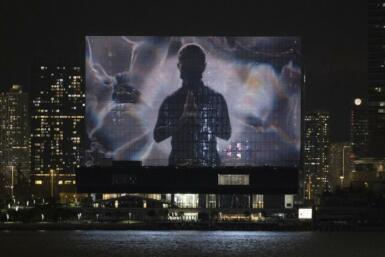DeBoer to co-facilitate online roundtable on urban screens, media art
Media School associate professor Stephanie DeBoer and Arizona State University associate professor Kristy H. A. Kang will curate and produce an online roundtable on the potentials and problems of urban screens and media art this month.
“Emergent Visions Provocations #1: Hong Kong Dialogue” is the first in a series of roundtable discussions on urban screens and public media art. It is inspired by Ellen Pau’s site-specific moving image artwork created for the M+ Façade. The event will occur at 6 a.m. MST, 8 a.m. EST, 1 p.m. GMT and 9 p.m. HKT on Jan. 17 via Zoom.
“This event and the larger concerns that Emergent Visions explores is grounded in the question of how we can understand placemaking and public space in cities that are increasingly mediated and digital,” Kang said. “This research asks how cities and their communities tell stories using new and emerging media and how this potentially changes the way that we experience public spaces in diverse places around the world.”

DeBoer and Kang are two of the organizers of the Emergent Visions project, which began as a 2018 symposium at Nanyang Technological University, where Kang was prior to moving to ASU. The provocations aim to continue the work of the symposium and help create an extended community, DeBoer said.
“The dialogue that took place at the symposium among media artists, curators and scholars was incredibly thought-provoking,” she said. “The work of media artists, curators and scholars can be quite discipline- or practice-specific – the symposium was an opportunity to talk across these various disciplines and practices and potentiate new insights, perhaps even practices concerning the possibilities and problems of urban screens and public media art.”
The online event creates a space for global participation.
“We think it very important that the participants of the symposium, as well as of these provocations, reflect a wide range of global locations and practices,” DeBoer said.
The provocation will be held as a Zoom roundtable and recorded, transcribed and uploaded to an Emergent Visions online platform the team is developing as a resource, DeBoer said.
“I’m so taken by the insights that are potentiated here,” DeBoer said. “I think it is also significant that we are [initiating] our online series of provocations with a focus on Hong Kong urban screens and media art.”
Focusing this first discussion on the 2022 media art piece “The Shape of Light” will bring attention to the work of Ellen Pau, who has been central to the development of video and media art in Hong Kong for the past four decades, DeBoer said.
“At the same time, cities in East and Southeast Asia such as Hong Kong are central sites for the development of urban screens and the various practices that surround them,” she said.
Kang’s favorite part of this work is bringing together people who are artists, curators and scholars in the field from diverse perspectives and places but who may not have been brought together in conversation before, she said.
“In academia, disciplines are often not very porous, and I think that what we are doing with Emergent Visions is exciting because it creates a space in which people from different disciplines can encounter each other, from different places in the world, and new conversations and ideas can emerge,” Kang said.
The January event will feature:
- Ellen Pau, a Hong Kong-based media artist
- Silke Schmikl, a Hong Kong-based curator
- Chris Berry, a London-based scholar and critic

The participants will reflect on Pau’s recent “The Shape of Light” project, curated for the M+ museum façade. The provocation is free, but registration is needed.
Two more provocations are expected in 2023, with each engaging in conversations based in a different city in the world, its place and practices in relation to urban media art, Kang said.
Emergent Visions dialogues are made possible by the support of Nanyang Technological University, The Media School at Indiana University, and Indiana University’s College Arts & Humanities Institute.

